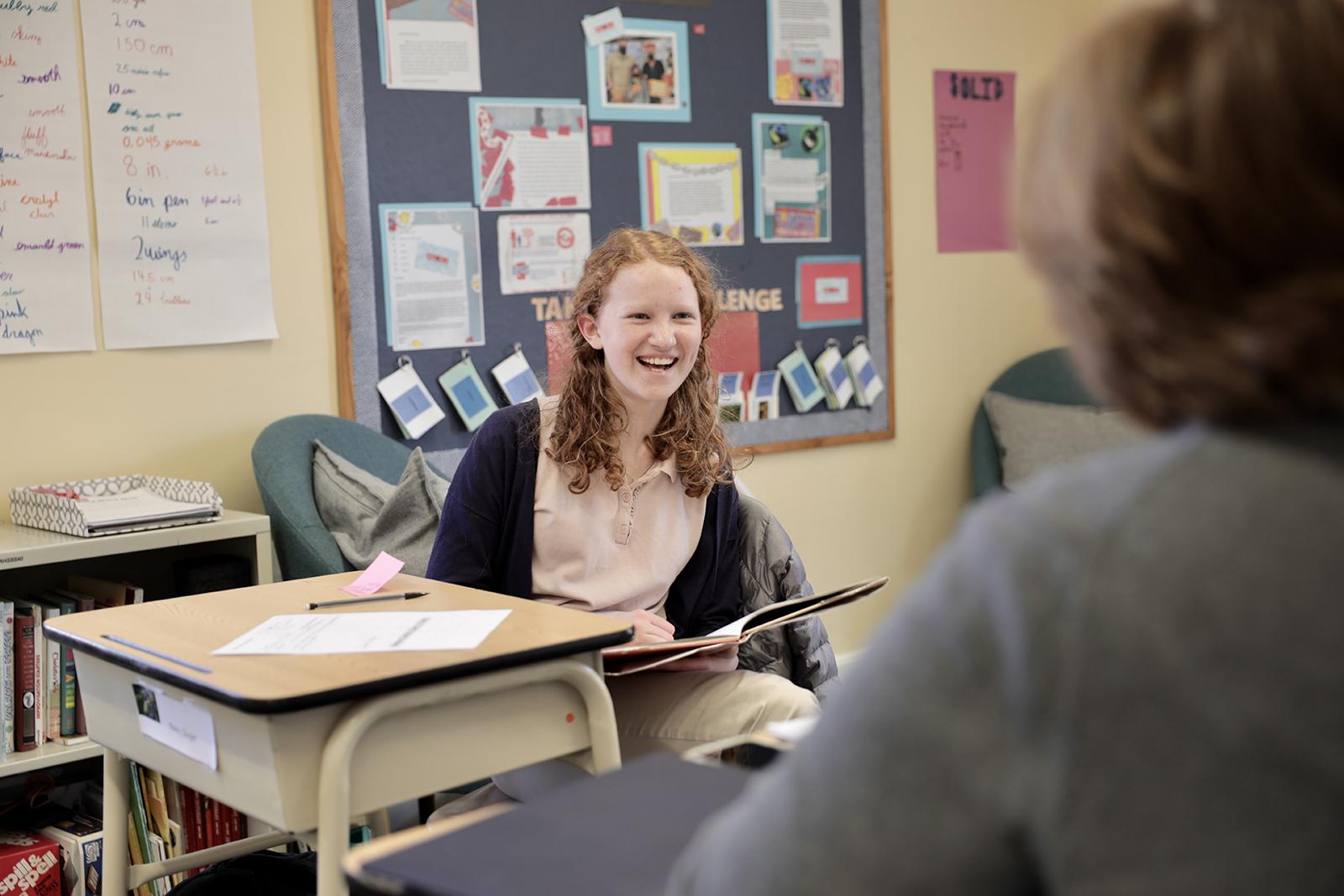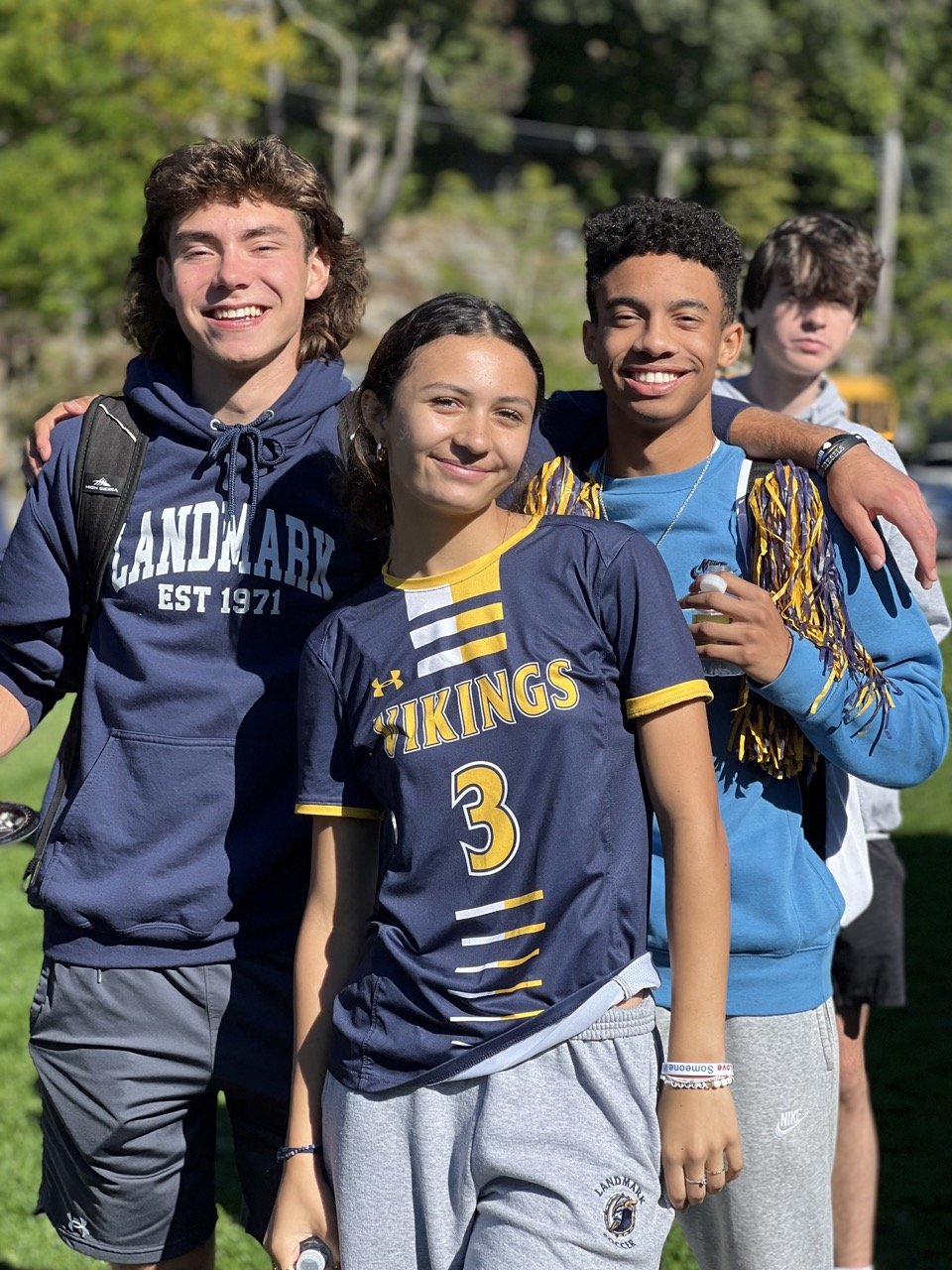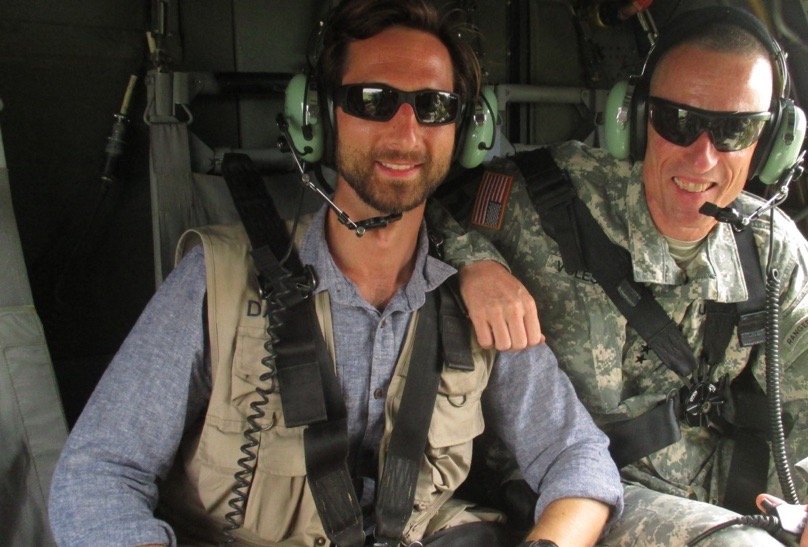- Our School
- Our Advantage
- Admission
- Elementary•Middle School
- High School
- Summer
- Giving
- Parent Resources
- For Educators
- Alumni
Concussion Information and Protocol
Medical management of sports-related concussion is evolving. In recent years, there has been a significant amount of research into sports-related concussion in athletes. Landmark School has established this document to provide education about concussions. These guidelines outline procedures to follow in managing head injuries, and outlines school policy as it pertains to return to play procedures after sports-concussion.
Landmark School seeks to prevent concussion and provide a safe return to activity for all students after an injury, particularly after a head injury. In order to effectively and consistently manage these injuries, the Athletic Department abides by the following procedures that have been developed to aid in ensuring that concussed athletes are identified, treated and referred appropriately, receive appropriate follow-up medical care during the school day, including academic assistance, and are fully recovered prior to returning to athletic activity.
The Licensed/Certified Athletic Trainer (ATC) in collaboration with the health center will take a multifaceted approach to concussion management. As a result, the information provided by this protocol and the tools and references, including test results, should always be interpreted in the context of all clinical information including the player's medical history. Therefore, in certain cases, modifications to this protocol may be deemed appropriate by the medical staff.
I. Educational Training
1. All coaches and athletic staff will be required to complete a yearly course on concussion education and submit a certificate of completion to the ATC. Coaches will also be given written and verbal information prior to each season during the coaches meeting.
2. All parents and students are encouraged to complete one of the two courses as well and will be provided with written information on concussion via email at the beginning of the school year.
3. All student-athletes will be encouraged to view the video Concussion for Students by the National Federation of State High School Associations.
https://www.cdc.gov/headsup/youthsports/training/index.html
https://www.nfhslearn.com/courses/concussion-in-sports-2
II. Prior to Participation
All athletes must have a current physical examination on file in the health center in order to participate in athletics. No athlete will be allowed to participate, in any way, until a hard copy is on file. Athletes whose physical exam expires during the season must obtain an updated exam or obtain written clearance from their primary care physician in order to maintain eligibility while an appointment is secured. There is a 13-month window to secure renewed physical exams.
Any athlete who has or may have sustained a concussion outside of Landmark School must inform the health center and the ATC.
III. Management and Referral Guidelines
Any athlete with a witnessed loss of consciousness (LOC) of any duration will be transported immediately to the nearest emergency department. Any athlete who has symptoms of a concussion, and who is not stable (i.e., condition is changing or deteriorating) will be transported immediately to the nearest emergency department.
An athlete who exhibits any of the following symptoms will be transported immediately to the nearest emergency department:
- amnesia lasting longer than 15 minutes
- deterioration of neurological function including cranial nerve deficits
- decreasing level of consciousness
- decrease or irregularity in respiration
- decrease or irregularity in pulse
- unequal, dilated, or unreactive pupils
- any signs or symptoms of associated injuries, spine or skull fracture, or bleeding, especially from the nose or ear
- mental status changes: lethargy, difficulty maintaining arousal, confusion or agitation
- seizure activity
An athlete who is symptomatic but stable, may be transported by his or her parent(s)/guardian(s). The parent(s)/guardian(s) will be advised to contact their primary care physician, or seek care at the nearest emergency department, on the day of the injury.
Any athlete who presents with signs or symptoms indicative of a concussion will be removed from play immediately and not return to participation that day.
The ATC will administer a formal sideline/AT room concussion assessment which may include the SAC, SCAT2, BESS, and PCSS as well as a physical examination. The ATC will provide the athlete written and verbal instructions and education about concussions and how they should proceed until they are cleared to participate.
Coaches will send any athlete suspected of sustaining a concussion to the ATC for assessment and will not return athletes to play, to practices, or contests unless the athlete has been cleared by the ATC. If a trained ATC is not available at a practice or contest, coaches will hold any athlete suspected of having a concussion out of participation until evaluated by an ATC trained in these guidelines. Coaches will inform any host school ATC of the school's concussion protocol when athletes are assessed away from Landmark School. When at Landmark School venues, coaches should contact the ATC immediately by cell phone whenever an athlete is suspected of sustaining a head injury. When at away contests, coaches will inform the ATC and health center of any athlete suspected of sustaining a concussion as soon as possible, but on the day of injury by phone or email.
The ATC will coordinate with the health center, on all cases of suspected concussion, for the contact of the athlete's parents/guardian, student life coordinator, house parent, and academic advisor. The ATC will also coordinate with the health center and residential life for the transport of any athlete, who sustains a concussion, to the ER or school physician.
The ATC, health center, consulting physician along with the athlete's parent/guardian, house parent, and academic advisor will collaborate on a plan for the athlete's academic, residential and athletic accommodations during the recovery process.
The ATC will communicate with the health center, on a daily basis, the status and progress of all athletes who sustain a head injury.
IV. Return to Play Guidelines
All athletes who sustain head injuries are required to be evaluated by their primary care physician (PCP) or school physician, and have a normal physical and neurological examination prior to being permitted to progress to activity. This includes athletes who were initially referred to the emergency department. These athletes are also required to follow up with their PCP or school physician. Landmark School strongly recommends and would prefer that athletes who have been diagnosed with a second concussion, during the school year, or who have a history of incidences of significant concussion provide clearance from a neurologist.
Athletes suspected of sustaining a concussion will be required to check in with the health center and the ATC on a daily basis to assess their status. Athletes who do not check in with the medical staff daily will delay their ability to return to participation.
No student athlete will begin a graduated physical return to play until all academic and school day restrictions are removed by their physician.
No athlete will be allowed to return to participation, in any capacity, until they are cleared by a physician and have completed a stepwise progression of activity with no recurrence of symptoms.
Landmark School will follow a stepwise progression of activity for all athletes, who have been diagnosed with a concussion, with the very minimum time frame as follows:
- No physical activity: complete rest for 24 hrs after symptom free
- Light aerobic exercise: stationary bike/walking (30%-40% maximum exertion) for 10 to 15 minutes
- Moderate aerobic exercise: (40%-60% maximum exertion) jogging, stationary bike, elliptical for 20-30 minutes
- Sport-specific exercise: (60%-80% maximum exertion) running drills, independent ball drills
- Non-contact training drills: (80% maximum exertion) more complex training drills, begin progressive resistance training
- Limited contact practice: controlled contact drills, no scrimmaging
- Full contact practice: normal practice routine
- Return to game play: normal game play
Each step requires the athlete to be symptom free for 24 hours before moving on to the next step. Any return of symptoms will require the athlete to return back to the initial step. If an athlete continues to have symptoms once some form of activity has begun and does not become symptom free within 24 hours, they must return to be reevaluated by their primary care or school physician.
Progression is individualized, and will be determined on a case-by-case basis. Factors that may affect the rate of progression include: previous history of concussion, duration and type of symptoms, age of the athlete, and sport/activity in which the athlete participates. An athlete with a prior history of concussion, one who has had an extended duration of symptoms, or one who is participating in a collision or contact sport will be progressed more slowly.
Landmark School medical staff, in consultation with the school physician, reserve the right to continue to withhold an athlete from participation until the staff deems fit. Any clearance note from an outside physician must include information indicating the day the athlete was injured, the diagnosis, and acknowledgment of clearance only after the school's stepwise progression is completed without return of symptoms.
Management and return to play decisions regarding athletes who have had two concussions in a calendar year will be considered on an individual basis by the ATC, Health Center, Academic Advisor, and consulting physician.
A third concussion in the same season may result in ending athlete participation for the season. Re-entry into athletics participation will be considered on an individual basis by the ATC with a conservative philosophy.








.jpg?v=1652115432307)




